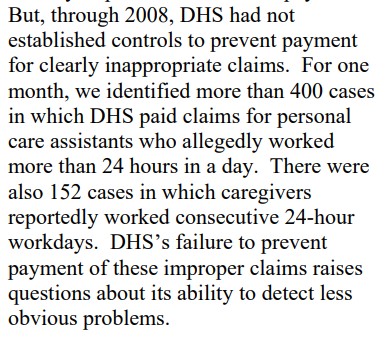Gov. Walz proposes a massive expansion of another fraud-prone program
The personal care assistant (PCA) program is slated to receive an additional $247 million per year, according to budget documents filed this week (page 25). The proposal (p. 28), would increase PCA minimum pay rates to $20 per hour.
Further, the proposal would allow an individual client to be staffed with two PCAs at the same time.
The program is administered in Minnesota by the state’s Department of Human Services (DHS). The PCA proposal is the Governor’s No. 1 request for this agency this year.
There are other spending requests. The DHS budget requires two and half pages just to list all of the new spending requests. It takes nearly 800 pages to describe them all. When introduced, the legislative bill for these proposals will run to thousands of pages.
The numbers behind the PCA program are staggering.
The state-sponsored program began in 1977 and currently serves 44,000 people per year (p. 26), with 38,000 served in an average month. The cost to serve this population exceeds $1 billion per year, from both state and Federal dollars. The Governor’s proposal would increase the cost of the program by approximately 20 percent.
Those served are disproportionately (70 percent) from minority communities, DHS reports.
DHS reveals that, since 2009, the agency has registered more than 180,000 people as PCAs (service providers, not clients, p. 368). Including previously registered PCAs, the University of Minnesota estimates that there are 204,000 PCAs working in Minnesota, including those serving non-subsidized (private) patients.
This PCA army, if it were a separate city, would be Minnesota’s third largest. Out of Minnesota’s working-age population (from 18 to 64), nearly 6 percent (one in every 17 adults) are working as PCAs.
This source lists the total number of home health care and personal care aides at 109,000. Still, this level makes the profession the largest in Minnesota. To compare, in Florida, a state with four times the population, the profession ranks 30th, with 67,000 practitioners.
According to the U.S. Bureau of Labor Statistics (BLS), Minnesota’s 109,000 PCAs rank fifth in the nation, behind only the much larger states of California, New York, Texas, and Pennsylvania. In terms of per capita PCAs, Minnesota ranks behind only California and New York.
It should be noted that PCAs and the companies that employ them do not need licenses from DHS, they need merely to be registered and meet minimum requirements. Some training is required.
Some 200 new would-be PCA providers apply each day. The agency is so overwhelmed with a backlog of applications that some 1,000 applicants are stuck in limbo over the rudimentary background checks conducted by the state, WCCO reports.
The program has been plagued by fraud for years. In 2022, a Brooklyn Center woman was sentenced to five years in prison for defrauding the program for $850,000. She was one of eight charged in the scheme. A Rochester woman was charged last year with a smaller-scale fraud against the program.
In 2009, the Office of the Legislative Auditor issued a report on the PCA program at DHS. At that time, the program spent $400 million per year.
Among the many, many findings made by the OLA were the following,

Since then, DHS has fixed such obvious program flaws. The OLA did a follow up report in March 2020 which noted some improvement in DHS billing systems. The OLA reports that DHS systems flag billing requests for more than 24 hours in a day or consecutive 24-hr. workdays (p. S-2).
Still, the newer report made a number of significant findings, including that DHS failed to follow up on reports of suspected fraud in a timely manner.
It’s worth noting that the newest budget document for the Dept. of Education (MDE) — which oversaw the Feeding Our Future scandal —mentions the word “fraud” 12 times. The DHS budget mentions the word “fraud” 75 times in its 821 pages.
And the two are connected. In May 2022, I profiled a figure in the Feeding Our Future scandal who would go on to become defendant No. 2 in the case. As a sideline, he owned a PCA business getting cash payments from DHS, in addition to his free-food endeavors, funded by MDE.
He wasn’t the only one. The Minneapolis Star Tribune documents that 14 (out of 50) individuals indicted in the Feeding Our Future case continue to receive millions of dollars in payments from DHS for day cares and related businesses.
The Walz budget document describes the PCA pay increase as a “recommendation” (p. 25), but it’s already a done deal. The pay hike was included in the contract negotiated between the Walz Administration and the primary PCA union, the Service Employees International Union (SEIU).
SEIU endorsed Gov. Walz in his re-election effort last year. SEIU and its various related entities are among the largest contributors to Democratic campaign efforts in Minnesota. Their main campaign finance entity, the SEIU Minn State Council Political Fund, raised and spent $1.5 million on behalf of Minnesota Democrats from January through October of last year.
To quote SEIU itself,
At SEIU, we make politics work for us by holding our elected officials accountable to our values as working people.
Indeed, and cheap at twice the price.